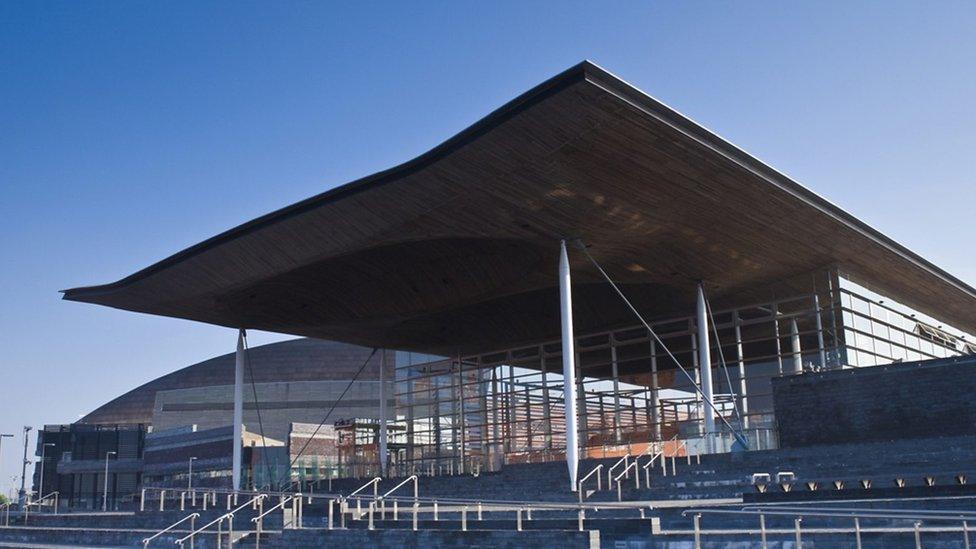Has Wales embraced the Welsh Assembly 20 years on?
- Published
- comments
What has the Welsh Assembly done for you?
Showing a class of AS level politics students some of the landmark moments of Welsh devolution is a sobering experience.
In the Welsh Assembly, which enters its 20th year this week, politicians voted to make Wales the first place in the UK to charge for carrier bags.
It was an important moment of leadership, years before concern over plastic pollution was the subject of prime time television.
Later there was the reform of the organ donation system: presumed consent, a measure designed to save lives all over the UK.
As the students, from Cardiff and Vale College, have grown up, the Welsh Assembly has grown with them. It has gone from being an assembly with no ability to make laws without the permission of the UK Parliament, to a Parliament itself in all but name.
It can make laws, agree taxes (including income tax) and scrutinise the Welsh Government's running of every day services like health, schools and housing.
But one of the students we spoke to, Bill, said he did not think the assembly had "much influence compared to Westminster".
Rhyddian said: "Because Parliament still has some jurisdiction over Wales, people just don't understand the difference between them.
"They probably just see it as less important."
Another said the difference between Parliament and the assembly is not understood, while one student said his friends understand the assembly "but just don't care".
They would not be alone in their reluctance to engage.

Alun Michael led the government in the assembly when it opened in 1999 - much has changed since those early days
Although there was a referendum in 2011 to give the assembly more powers, and successive opinion polls suggest it's become a settled feature of Welsh life, turnout in an assembly election has never been higher than 46%.
And surveys indicate that many people don't realise that it is the Welsh Government, scrutinised by the assembly, not the government in London, which controls most of the day-to-day services we all use.
It's a far cry from Scotland where turnout at Scottish Parliament elections is usually more than 50%.
My colleague Brian Taylor, BBC Scotland's Political Editor, says much of the reason for that is historical.
"Scotland was a sovereign state, a sovereign nation for many centuries," Mr Taylor said.
There are other reasons too. Wales has a weaker media which hinders robust scrutiny and the communication of information about Welsh politics.
One party, Welsh Labour, has dominated the political landscape and governed continuously for the last 20 years.
Opposition parties have failed to persuade voters to trust them with the reins of government.

Wales was the first part of the UK to charge for plastic bags
Yet one of the big arguments in favour of devolution is that it brings decision making closer to the people whose lives are affected by those decisions.
There's the feeling among many voters across Wales that the assembly is too Cardiff-centric - in other words not close enough.
So if most voters aren't connecting with the Welsh Assembly, that's a problem.
Sometimes, the roles of the assembly and the Welsh Government get confused as well.
The government makes decisions and proposes policies, while the assembly's role is to scrutinise that and decide whether to support them.

Laura McAllister, professor of public policy at Cardiff University, said the assembly had a "chequered past"
Many would argue the assembly has spent much of its life ill equipped to carry out that role properly.
Prof Laura McAllister says it has only recently come of age.
"If you look at the history of the last 20 years we know it had a pretty chequered past, with a ridiculous model of devolution at the outset," the Cardiff University academic said.
"Only now is it fit for purpose."
Criticisms about the failure to address the poverty that plagues so much of Wales and the underlying problems of an under-performing economy are really about the performance of the Welsh Government, not the Welsh Assembly itself.
Successive Welsh Governments would point out they have never had control over welfare or big economic levers.
But some would argue there has been a reluctance to wrestle with difficult issues.
Big projects have been proposed, encountered controversy and been left to drift, like local government reorganisation or the M4 relief road.
The latter is a proposal older than the assembly itself. We are told there'll be a decision on that in June.
In the meantime the assembly is using this anniversary to reach out. In July it is planning a citizens' assembly where people can discuss some of the big issues facing Wales in the years ahead.
It's already running a youth parliament and there are proposals to reduce the voting age to 16.
Engage them early, engage them for life - that's the hope anyway.
- Published18 September 2017
- Published18 September 2017
